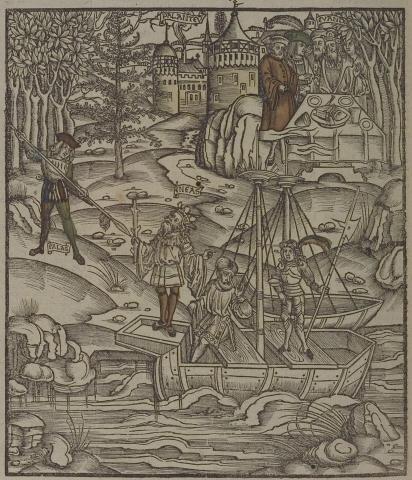Annotations
Aeneas arrives with his two ships at Pallanteum (107-8). The city, shown at the top center, does not have very large walls, and its towers are not very tall, indicating that the city is well-built with necessary defenses, but without any excess. When Aeneas arrives, Evander is holding a ritual sacrifice to Hercules in a sacred grove, attended by his son Pallas [Palas], and the top men of his city (102-6). Upon seeing the strangers approach their shore, the men have stopped eating (107-10). Pallas has run to a high mound above the shore, and even before the strangers disembark, he points his spear at them and begins questioning Aeneas (110-4). Aeneas holds out an olive branch in an offering of alliance with King Evander (115-20). This image is one of a handful that have some degree of color beyond the usual black and white. Pigments of brown and green have been used to color in the legs of Aeneas, the clothing and hat of Pallas, the hat of one prominent citizen, and the coat of another. The coloring was most likely added to the image at a later date. (Katy Purington)
Woodcut illustration from the “Strasbourg Vergil,” edited by Sebastian Brant: Publii Virgilii Maronis Opera cum quinque vulgatis commentariis expolitissimisque figuris atque imaginibus nuper per Sebastianum Brant superadditis (Strasbourg: Johannis Grieninger, 1502), fol. 312v, executed by an anonymous engraver under the direction of Brant.


Sebastian Brant (1458-1521) was a humanist scholar of many competencies. Trained in classics and law at the University of Basel, Brant later lectured in jurisprudence there and practiced law in his native city of Strasbourg. While his satirical poem Das Narrenschiff won him considerable standing as a writer, his role in the transmission of Virgil to the Renaissance was at least as important. In 1502 he and Strasbourg printer Johannes Grüninger produced a major edition of Virgil’s works, along with Donatus’ Life and the commentaries of Servius, Landino, and Calderini, with more than two hundred woodcut illustrations. (Annabel Patterson)